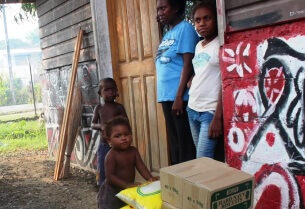Both natural and man-made disasters affect people in many different ways. For some, it is the loss of a loved one, for others it is the land that cost them their entire life savings, and for others it is the loss of the place they lay their head every night to sleep.
Honiara is the capital city of the Solomon Islands, a country that has recently come out of an ethnic tension spanning almost five years.
Flash floods hit Honiara on 3rd April 2014, killing 22 people and leaving thousands of people homeless, some of whom are still living in emergency centres. For many of these people the best they can do is live each day as it comes.
Visiting the emergency centres, one can almost feel the desolation that these families face, not knowing where to go. Most of these families have arrived in Honiara after migrating from other provinces – looking for better opportunities in the bright lights of Honiara city. They have come in huge numbers only to find that there is no promise of job opportunities, accommodation, clean running water or proper sanitation.
Some of these migrants went on to build semi-permanent dwellings along the Mataniko River, also known as ‘no man’s land’. Their families have increased in numbers and they rely on the river for their daily livelihood.
They have lived in the area for so long and survived many storms and cyclones, and yet no one ever thought flooding of such magnitude would occur.
Communities were not prepared for a disaster of this kind. Those who died were caught in the floods and drowned. There was little that could be done by those on higher ground, who watched helplessly as women and children were swept away.
Climate change is playing its part in such catastrophes, and yet there is very little that the governments of our day are doing to provide much needed awareness so that in the future there is no unnecessary loss of innocent lives and properties.
In all these things and in all of this suffering God remains true to His people. The chapel at Koa valley, a satellite parish of All Saints in Honiara city, was untouched though houses surrounding the chapel were washed away by the flood.
The Anglican Church of Melanesia has been instrumental in providing food aid and shelter to those displaced by the disaster. They still provide pastoral support and counselling, and the church is engaged in the rehabilitation and repatriation process with the Government.
As a church community we have been hit by disaster, but we do not give up hope. We continue to appreciate your prayers and support as we rise above the floods and look forward together.
Archbishop David Vunagi has spoken out in this article on the Anglican Church of Melanesia’s new website. He said, “Maybe this is a time when we learn that we must know God and be God centered and God focused in our lives.”

